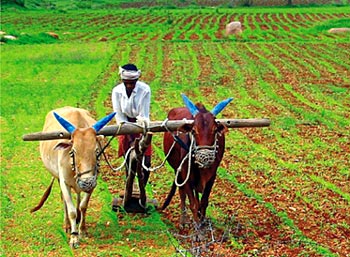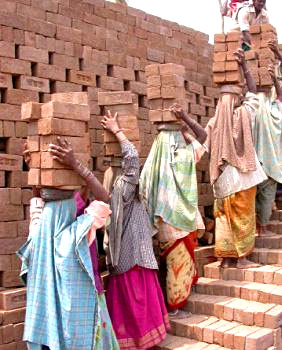 Agriculture, however, remains the principal occupation in Indian villages from the ancient period. The climatic conditions in most parts of India are suitable for agricultural activities and hence, India has become one of the leading producers of agricultural products in the world. In the changing time agriculture has been replaced by other occupations in different parts of India in the contemporary period. Other occupation in Indian villages includes the priests, carpenters, blacksmiths, barbers, weavers, potters, oil pressers, leatherworkers, sweepers, water bearers, toddy-tappers and many others.
Agriculture, however, remains the principal occupation in Indian villages from the ancient period. The climatic conditions in most parts of India are suitable for agricultural activities and hence, India has become one of the leading producers of agricultural products in the world. In the changing time agriculture has been replaced by other occupations in different parts of India in the contemporary period. Other occupation in Indian villages includes the priests, carpenters, blacksmiths, barbers, weavers, potters, oil pressers, leatherworkers, sweepers, water bearers, toddy-tappers and many others. However, most of the modern day Indian villages present a different scenario with villagers taking up the non-traditional occupations. They are involved in academics as teachers; truckers, clerks or getting engaged with various cottage industries, regardless of which caste or class they belong to. Different types of occupations are found in the modern Indian villages apart from agriculture or farming or the traditional occupations. The climate and location influence occupation in Indian villages to a large extent. In the villages of hilly areas, the principal occupations include agriculture and gardening. Several villagers in the South Indian states like Kerala, Andhra Pradesh, Tamil Nadu, Karnataka, etc. have taken fishing as the main source of income. This is mainly because of the coastal location of the states. However, agriculture is still the principal occupation in the northern and eastern Indian villages.
 Another major occupation in Indian villages is the cottage industry. Cottage industry has emerged as a major source of employment in Indian villages over the period of time. Many villagers are involved in various kinds of art and crafts works. The villagers produce different types of handicrafts products and many of them are earning their livelihoods by marketing them. The occupations like artisan in pottery, wood, cloth, metal and leather have been in existence in Indian villages, since the ancient period and are found even in the modern times. Many Indian villagers are dependent on these occupations to earn their livelihoods.
Another major occupation in Indian villages is the cottage industry. Cottage industry has emerged as a major source of employment in Indian villages over the period of time. Many villagers are involved in various kinds of art and crafts works. The villagers produce different types of handicrafts products and many of them are earning their livelihoods by marketing them. The occupations like artisan in pottery, wood, cloth, metal and leather have been in existence in Indian villages, since the ancient period and are found even in the modern times. Many Indian villagers are dependent on these occupations to earn their livelihoods. The women in the rural areas, too are actively getting involved in different industries like matchbox and firework industries, Bidi making, agate and slate industries, coffee and tea industries, brick industry, construction industry, electronics industry, spice industries, etc. Among these, the Bidi, slate or brick making industries are the most well spread industries in Indian villages. Apart from these industries, the Indian villagers have also become sweepers and scavengers.
Tourism sector has emerged as one of the major occupations in Indian villages, in the contemporary period. Villages in most parts of India are endowed with natural beauty and have a rich tradition and cultural heritage. The rich cultural diversity in the villages attracts many tourists from all over the world every year. This has encouraged many villagers to get involved in various tourism related occupations. The villagers work as tourist guides or run different kinds of business in the famous tourist spots or even provide accommodation facilities to the tourists to earn their livelihoods.
The occupation scenario in Indian villages has changed mainly due to the changing economical scenario of the villages of India. The invention of new technologies has encouraged the Indian villagers to take up new occupations. Apart from that, decline in the fertility of lands in many villages has also forced many villagers to give up their traditional occupation of agriculture. Many of these villagers have moved to the nearby urban areas in search for alternative occupation.
No comments:
Post a Comment